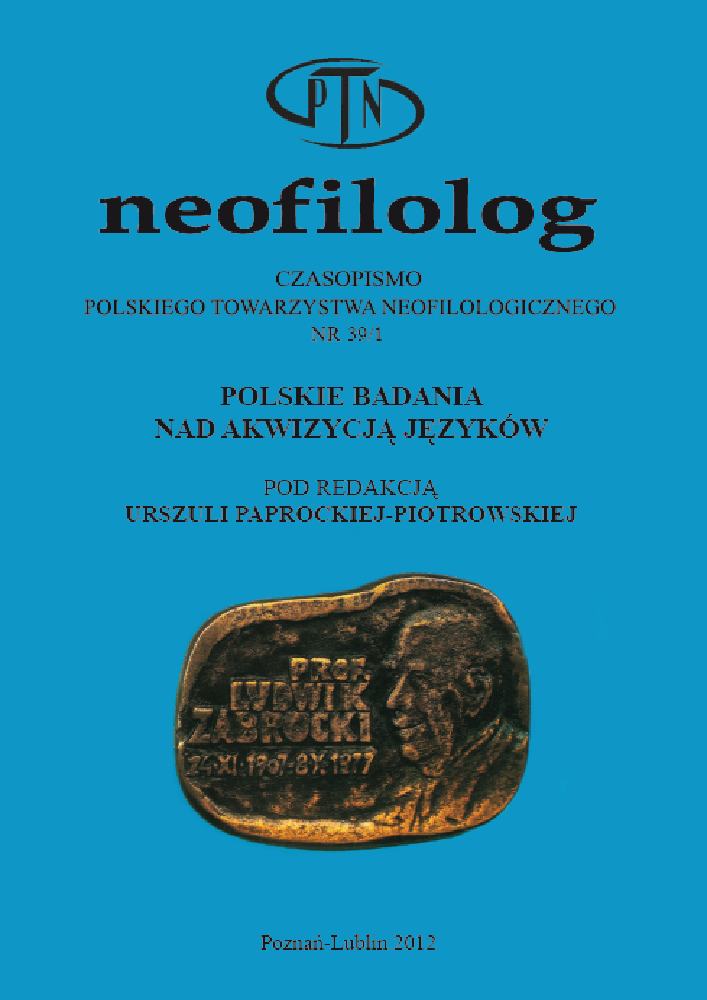Abstrakt
The general aim of this article is to present second language acquisition from the perspective of an English philology student. Taking the position that identity is a relevant concept in language acquisition, it explores how the identity of English philology students, both day and extramural, is constructed in their narratives when drawing on Bakhtin’s notions of „chronotope” and „heteroglossia”.
Bibliografia
Bauman, Z. 2005. Liquid Life. Cambridge: Polity Press.
Block, D. 2007. Second Language Identities. London: Continuum.
Burzyńska, A. i Markowski, M.P. 2007. Teorie literatury XX wieku. Kraków: Wydawnictwo Znak.
De Fina, A. i Georgakopoulou, A. 2012. Analysing Narrative. Discourse and Sociolinguistic Perspectives. Cambridge: Cambridge University Press.
Dornyei, Z. i Ushioda, E. (red.). 2009. Motivation, Language Identity and the L2 Self. Clevedon: Multilingual Matters.
Dufva, H. 2006. „Beliefs in dialogue: a Bakhtinian view” (w) Beliefs about SLA: New Research Approaches (red. P. Kalaja i A.M.F. Barcelos). New York: Springer: 131-152.
Duszak, A. 2002. „Us and others: An introduction” (w) Us and Others. Social Identities across Languages, Discourses and Cultures (red. A. Duszak). Amsterdam: John Benjamins: 1-28.
Gieve, S. i Miller, I.K. 2008. “What do we mean by ‘quality of classroom life’?” (w) Understanding the Language Classroom (red. S. Gieve i I. K. Miller). Basingstoke: Palgrave Macmillan: 18-46.
Golombek, P.R. 2011. „Dynamic assessment in teacher education: Using dialogic video protocols to intervene in teacher thinking and activity” (w) Research on Second Language Teacher Education (red. K. E. Johnson i P. R. Golombek). New York – London: Routledge: 121-136.
Hosenfeld, C. 2006. „Evidence of emergent beliefs of a second language learner” (w) Beliefs about SLA: New Research Approaches. (red. P. Kalaja i A.M.F. Barcelos). New York: Springer: 37-54.
Hyland, K. 2012. Disciplinary Identities. Individuality and Community in Academic Discourse. Cambridge: CUP.
Jenkins, J. 2000. The Phonology of English as an International Language. Oxford: OUP
Jenkins, J. 2007. English as a Lingua Franca: Attitude and Identity. Oxford: OUP.
Johnson, K. 2003. „Every experience is a moving force: Identity and growth through mentoring”. Teaching and Teacher Education 19: 787-800.
Kachru, B. 1986. The Alchemy of English. The Spread, Functions and Models of Non-Native Englishes. Oxford: Pergamon Press.
Kiernan, P. 2010. Narrative Identity in English Language Teaching. Basingstoke: Palgrave Macmillan.
Kramsch, C. 2001. „Social discursive constructions of self in L2 learning” (w) Sociocultural Theory and Second Language Learning (red. J.P. Lantolf). Oxford: Oxford University Press: 133-154.
Marchenkova, L. 2005. Interpreting Dialogue: Bakhtin’s Theory and Second Language Learning. http://etd.ohiolink.edu/send-pdf.cgi/Marschenkova%20Ludmila%20Alexandrovna.pdf?osu1111777929 [DW: 15.08.2012].
Morgan, B. 2004. „Teacher identity as pedagogy: Towards a field-internal conceptualization in bilingual and second language education”. Bilingual Education and Bilingualism 7/2-3: 172-188.
Morgan, B. i Clarke, M. 2011. „Identity in second language teaching and learning” (w) Handbook of Research in Second Language Teaching and Learning (red. E. Hinkel).New York – London: Routledge: 817-836.
Norton, B. 2000. Identity and Language Learning: Gender, Ethnicity and Educational Change. London: Longman.
Pavlenko, A. i Lantolf, J.P. 2001. „Second language learning as participation and the (re)construction of selves” (w) Sociocultural Theory and Second Language Learning (red. J.P. Lantolf). Oxford: Oxford University Press: 155-178.
Róg, T. 2012. „Bakhtinian dialogical principle as a philosophical rationale behind intercultural studies” (w) Informed Teaching (red. H. Lankiewicz i E. Wąsikiewicz-Firlej). Piła: PWSZ: 69-80.
Rubacha, K. 2008. Metodologia badań nad edukacją. Warszawa: Wydawnictwa Akademickie i Profesjonalne.
Rutkowiak, J. 2010. „Neoliberalizm jako kulturowy kontekst kształtowania tożsamości współczesnego nauczyciela. Ku problematyce oporu i odporu” (w) Neoliberalne uwikłania edukacji (red. E. Potulicka i J. Rutkowiak). Kraków: Impuls: 203-228.
Saville-Troike, M. 2012. Introducing Second Language Acquisition. Cambridge: Cambridge University Press.
Sławek, T. 2012. „Mądrość i statystyka”. Tygodnik Powszechny. tygodnik.onet.pl/30,0,77257,madrosc_i_statystyka,artykul.html [DW: 27.07. 2012].
Tucholska, K. 2007. Kompetencje temporalne jako wyznacznik dobrego funkcjonowania. Lublin: Towarzystwo Naukowe KUL.
Varghese, M., Morgan, B. i Johnson, K. 2005. „Theorizing language teacher identity: Three perspectives and beyond”. Journal of Language, Identity, and Education 4/1: 21-44.
Walczak, A. 2011. Spotkanie z wychowankiem. Ku tożsamości ipse pedagoga. Łódź: Wydawnictwo Uniwersytetu Łódzkiego.
Licencja
Prawa autorskie (c) 2012 Dorota Werbińska

Utwór dostępny jest na licencji Creative Commons Uznanie autorstwa – Bez utworów zależnych 4.0 Międzynarodowe.
Przedstawiany utwór (artykuł) upubliczniany jest na podstawie umowy z autorem i na licencji Creative Commons Attribution-NoDerivatives 4.0 International (CC BY-ND 4.0).
Użytkownicy mają obowiązek podania wraz z rozpowszechnionym utworem, informacji o autorstwie, tytule, źródle (odnośniki do oryginalnego utworu, DOI) oraz samej licencji;
- bez tworzenia utworów zależnych,
- utwór musi być zachowany w oryginalnej postaci.
Uniwersytet im. Adama Mickiewicza w Poznaniu zachowuje prawo do czasopisma jako całości (układ, forma graficzna, tytuł, projekt okładki, logo itp.).
